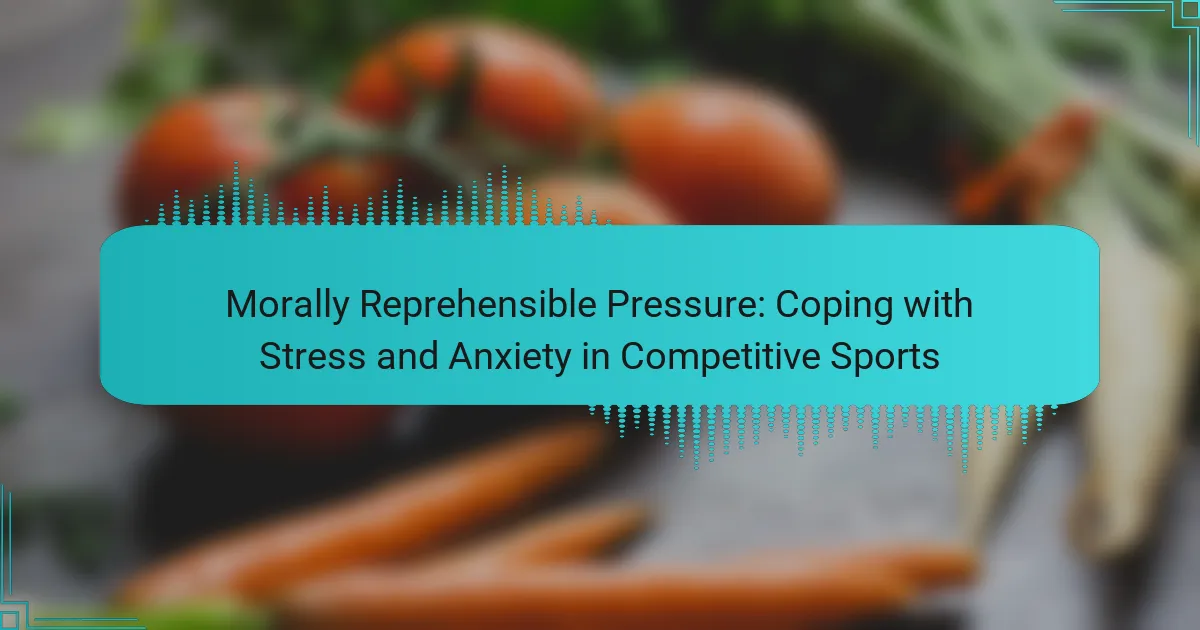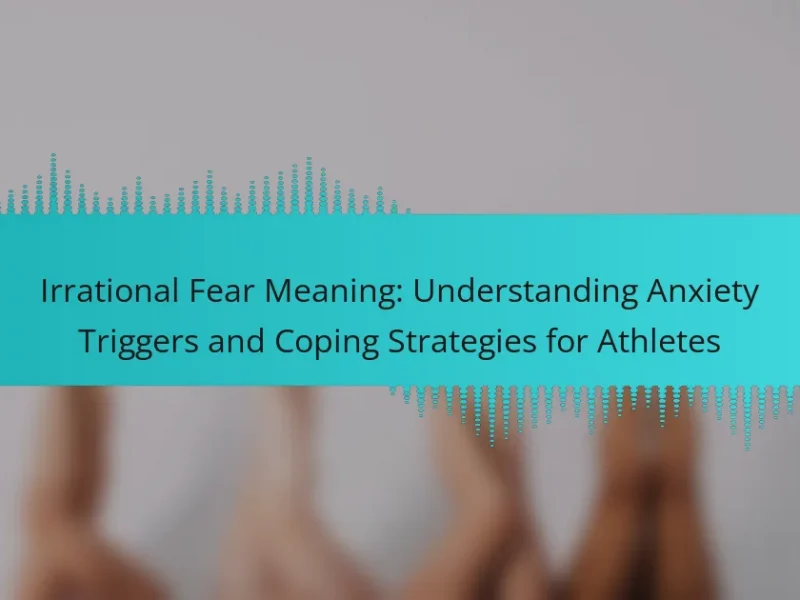Morally reprehensible pressure in competitive sports can lead to heightened stress and anxiety, impacting athletes’ mental health and performance. This article explores the negative effects of such pressure, effective coping strategies, and the importance of support systems. It also highlights rare methods for managing stress and emphasizes the need for best practices to enhance athletes’ well-being. Addressing these challenges is crucial for sustaining both mental health and athletic success.
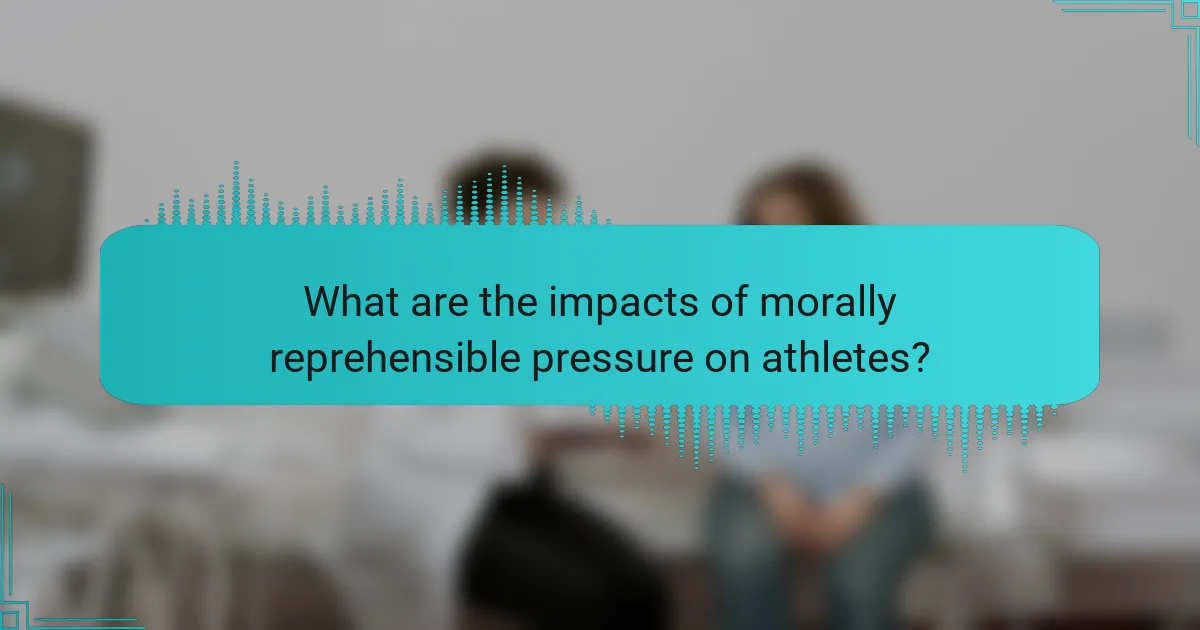
What are the impacts of morally reprehensible pressure on athletes?
Morally reprehensible pressure negatively impacts athletes by increasing stress and anxiety levels. This pressure can lead to mental health issues, reduced performance, and burnout. For instance, athletes may feel compelled to meet unrealistic expectations, resulting in chronic stress. As a result, coping mechanisms like seeking support or engaging in self-care become essential. The unique attribute of this pressure is its potential to create a toxic environment, undermining an athlete’s well-being and career longevity. Addressing these impacts requires systemic changes within competitive sports to prioritize mental health.
How does competitive pressure contribute to stress and anxiety?
Competitive pressure significantly contributes to stress and anxiety in athletes. This pressure arises from high expectations, fear of failure, and comparison with peers. Athletes often experience unique attributes of stress, such as performance anxiety, which can hinder their ability to compete effectively. As a result, coping strategies, including mindfulness and visualization, become essential for managing these psychological challenges. Understanding the root causes of competitive pressure can help athletes develop resilience and improve their mental health.
What psychological effects arise from high-stakes competition?
High-stakes competition can lead to significant psychological effects, including heightened stress and anxiety. Athletes often experience pressure to perform, which can result in mental fatigue and burnout. This pressure may stem from external expectations, such as those from coaches or fans, and internal expectations, including personal goals.
The impact of these psychological effects can be profound. For instance, athletes may develop performance anxiety, leading to decreased confidence and impaired performance. Additionally, the fear of failure can create a cycle of stress that negatively affects mental health.
Coping strategies are essential for managing these effects. Techniques such as mindfulness, visualization, and positive self-talk can help athletes navigate the pressures of competition. Furthermore, support systems, including coaches and mental health professionals, play a crucial role in fostering resilience.
Ultimately, understanding the psychological effects of high-stakes competition is vital for athletes, coaches, and sports organizations. By recognizing these challenges, effective strategies can be implemented to promote mental well-being in competitive sports.
What role does fear of failure play in athlete performance?
Fear of failure significantly impacts athlete performance by inducing stress and anxiety. This pressure can hinder focus, reduce confidence, and lead to suboptimal performance during competitions. Athletes often perceive failure as a threat to their identity and reputation, which can exacerbate performance anxiety. Research shows that managing this fear through mental techniques, such as visualization and positive self-talk, can enhance resilience and improve outcomes. Athletes who develop coping strategies for this fear tend to perform better, demonstrating the importance of psychological preparation in competitive sports.
How does societal expectation amplify stress levels?
Societal expectations significantly increase stress levels in competitive sports. Athletes face immense pressure to perform, driven by public scrutiny and personal aspirations. This pressure often leads to anxiety, impacting mental health and performance. Studies show that high expectations can result in burnout, highlighting the need for effective coping strategies.

What universal coping strategies can athletes employ?
Athletes can employ several universal coping strategies to manage stress and anxiety effectively. Techniques include mindfulness, which enhances focus and reduces anxiety, and visualization, which prepares mental scenarios for competition. Deep breathing exercises promote relaxation, while goal-setting helps maintain motivation and clarity. Social support from teammates fosters a sense of belonging and reduces feelings of isolation. Regular physical activity also serves as an outlet for stress relief. These strategies create a comprehensive toolkit for athletes facing morally reprehensible pressure in competitive sports.
How do breathing techniques help manage anxiety?
Breathing techniques significantly reduce anxiety by promoting relaxation and enhancing focus. These methods help athletes manage stress during competitions, improving performance. Techniques like diaphragmatic breathing lower heart rates and activate the parasympathetic nervous system, creating a calming effect. Research shows that consistent practice can lead to long-term anxiety reduction.
What role does physical conditioning play in stress management?
Physical conditioning significantly enhances stress management in competitive sports. Regular training improves physical resilience, which directly reduces anxiety levels. Increased strength and endurance foster a sense of control, leading to better coping strategies during high-pressure situations. Additionally, physical activity releases endorphins, promoting a positive mood and reducing stress perception. The unique attribute of tailored conditioning programs can further optimize mental health benefits, making athletes more equipped to handle competition-related stress.
How can athletes benefit from mental rehearsal and visualization?
Athletes can enhance performance and reduce anxiety through mental rehearsal and visualization techniques. These practices allow athletes to mentally simulate their performances, creating a sense of familiarity and control. Visualization improves focus, boosts confidence, and prepares the mind for competition, helping athletes cope with morally reprehensible pressure. Studies show that athletes who employ these techniques experience lower stress levels and improved outcomes, highlighting their unique attribute in competitive sports.
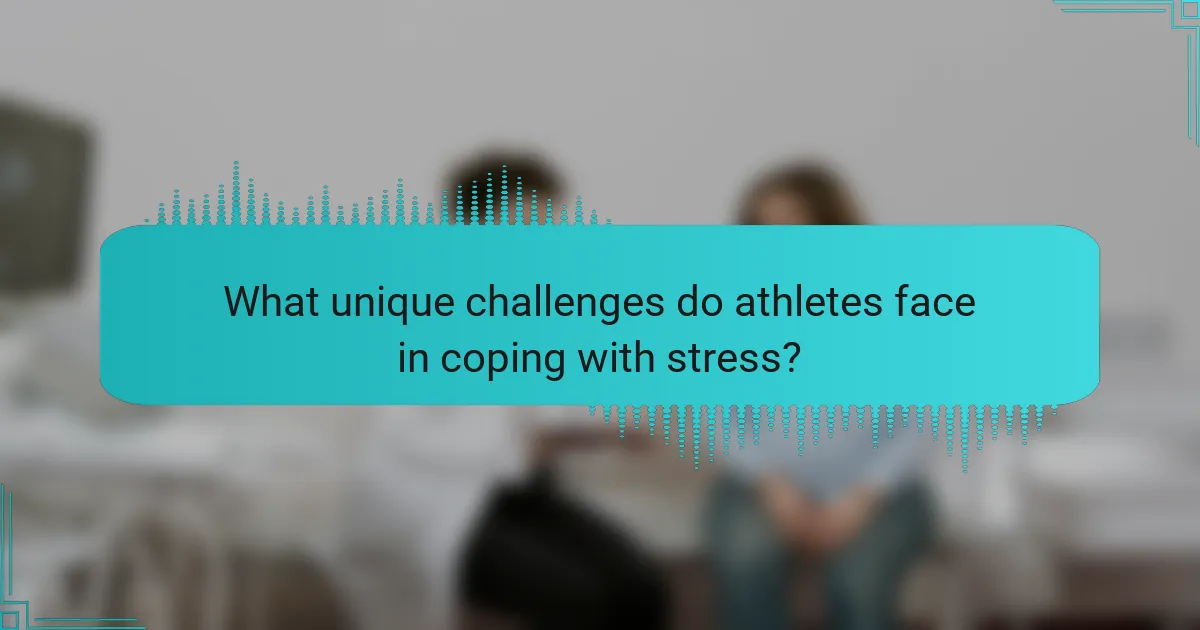
What unique challenges do athletes face in coping with stress?
Athletes face unique challenges in coping with stress due to high expectations and intense competition. These pressures can lead to anxiety, burnout, and performance issues. The need to maintain peak performance while managing personal and public scrutiny creates a distinct psychological burden. Additionally, the fear of failure can hinder their ability to cope effectively. Support systems and mental health resources are crucial for addressing these challenges.
How does the stigma around mental health affect athletes?
The stigma around mental health significantly harms athletes, leading to increased stress and anxiety. Athletes often feel pressured to maintain a facade of strength, which can prevent them from seeking help. This pressure can exacerbate mental health issues, resulting in decreased performance and overall well-being. Research indicates that nearly 35% of athletes experience mental health challenges, yet many remain silent due to fear of judgment. Addressing this stigma is crucial for fostering a supportive environment that encourages athletes to prioritize their mental health.
What are the unique pressures faced by female athletes?
Female athletes face unique pressures, including societal expectations, mental health challenges, and performance anxiety. These pressures often stem from gender stereotypes and the demand for perfection in their sport. Research indicates that 40% of female athletes experience significant stress related to body image and competition. Additionally, the pressure to balance athletic commitments with personal life can lead to heightened anxiety. Addressing these issues is crucial for fostering a supportive environment that promotes mental well-being among female athletes.
How do racial and cultural factors influence stress management?
Racial and cultural factors significantly influence stress management in competitive sports. Diverse backgrounds shape athletes’ coping strategies, impacting their performance and mental resilience. Cultural norms dictate emotional expression and stress responses, while racial identity can affect access to resources and support systems. Understanding these dynamics is crucial for developing tailored stress management techniques that respect individual experiences and enhance overall well-being.

What rare coping methods have proven effective for athletes?
Athletes have found rare coping methods effective for managing stress and anxiety. Techniques like visualization of success, sound therapy, and rhythmic breathing have shown promise. Visualization allows athletes to mentally rehearse performances, enhancing confidence. Sound therapy utilizes specific frequencies to reduce anxiety. Rhythmic breathing promotes relaxation and focus, helping athletes maintain composure under pressure. Each method addresses unique psychological challenges faced in competitive environments.
How can art and creative expression serve as an outlet for stress?
Art and creative expression can effectively reduce stress by providing a therapeutic outlet. Engaging in artistic activities allows individuals to process emotions, divert attention from stressors, and promote relaxation. Studies indicate that art therapy can lower cortisol levels, a key stress hormone, enhancing overall mental well-being. Additionally, creative expression fosters a sense of accomplishment, which can mitigate feelings of anxiety.
What innovative technologies are being used to manage anxiety in sports?
Innovative technologies such as biofeedback, virtual reality, and wearable devices are transforming anxiety management in sports. Biofeedback trains athletes to control physiological responses, enhancing performance under pressure. Virtual reality immerses athletes in realistic scenarios, helping them practice coping strategies. Wearable devices track stress indicators, providing real-time data for personalized interventions. These technologies address the unique challenges athletes face, promoting mental resilience and overall well-being.
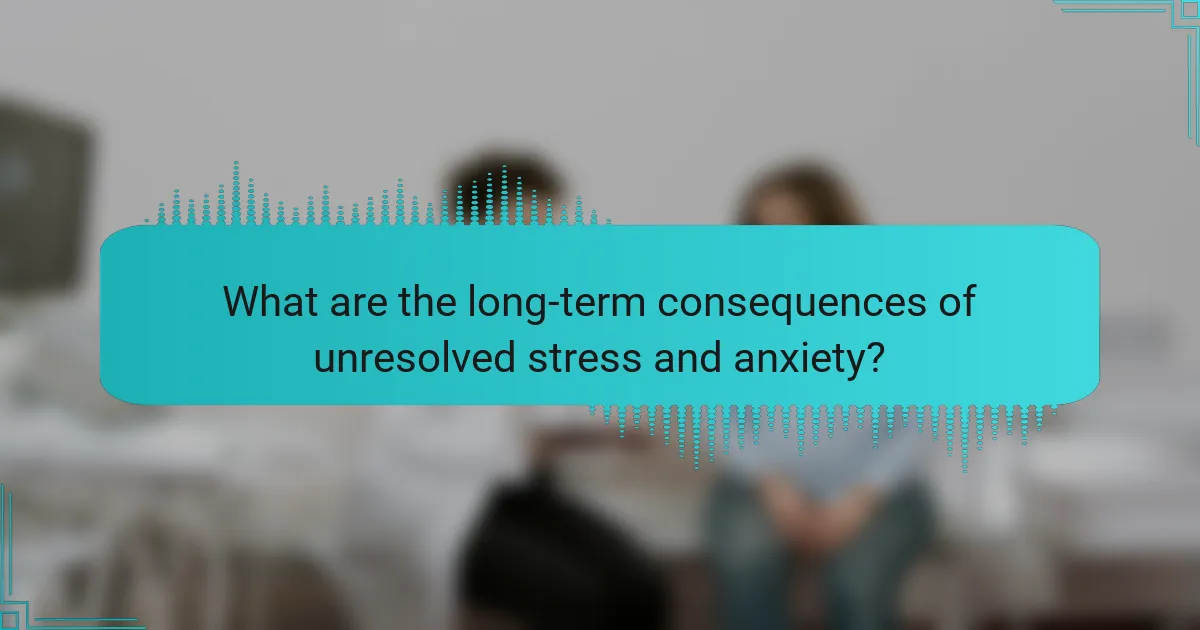
What are the long-term consequences of unresolved stress and anxiety?
Unresolved stress and anxiety can lead to serious long-term consequences, including chronic health issues. Prolonged exposure to stress negatively impacts mental health, increasing risks of depression and anxiety disorders. Physically, it can contribute to cardiovascular diseases, weakened immune function, and gastrointestinal problems. In competitive sports, athletes may experience burnout, reduced performance, and impaired recovery. Addressing these issues early is crucial for maintaining overall well-being and ensuring optimal athletic performance.
How does chronic stress affect athletic performance over time?
Chronic stress negatively impacts athletic performance by diminishing focus, increasing fatigue, and impairing recovery. Over time, athletes may experience decreased motivation and heightened anxiety, leading to suboptimal training outcomes. Studies show that prolonged stress can elevate cortisol levels, which adversely affects muscle repair and overall endurance. Athletes must adopt effective coping strategies to mitigate these stressors and maintain peak performance.
What are the potential physical health implications for athletes?
Athletes face significant physical health implications due to morally reprehensible pressure. Chronic stress can lead to injuries, fatigue, and cardiovascular issues. Anxiety may result in decreased immune function, making athletes more susceptible to illness. Overtraining, driven by external expectations, can cause hormonal imbalances and mental health disorders. These factors collectively hinder performance and overall well-being.

What best practices can athletes adopt for better mental health?
Athletes can adopt several best practices to enhance their mental health amidst competitive pressures. Prioritizing self-care, including adequate rest and nutrition, is essential. Mindfulness techniques, such as meditation and deep breathing, help manage stress. Establishing a strong support network, including coaches and mental health professionals, fosters resilience. Setting realistic goals and focusing on personal growth rather than external validation can alleviate anxiety. Engaging in regular physical activity outside of competition promotes overall well-being.
How can establishing a support network mitigate stress?
Establishing a support network significantly reduces stress in competitive sports. It provides emotional reassurance, practical advice, and shared experiences that foster resilience. Studies show that athletes with strong support systems report lower anxiety levels and higher performance. Engaging with peers, coaches, and family creates a sense of belonging, crucial for mental well-being. This unique attribute of social support directly mitigates the pressures of competition.
What are common mistakes athletes make in managing anxiety?
Athletes often make several mistakes in managing anxiety, including ignoring mental health, relying solely on physical training, and neglecting relaxation techniques. They may also avoid seeking professional help and underestimate the impact of anxiety on performance. Additionally, some athletes may engage in negative self-talk or maintain unrealistic expectations, exacerbating their stress levels.
How can self-care routines improve overall performance?
Self-care routines significantly enhance overall performance by reducing stress and anxiety in competitive sports. These practices promote mental clarity, emotional resilience, and physical well-being, ultimately leading to improved focus and stamina during competition. Engaging in regular self-care can lower cortisol levels, fostering a more balanced state of mind essential for peak athletic performance. Incorporating strategies like mindfulness, adequate rest, and nutritional balance can uniquely benefit athletes by enhancing recovery and sustaining energy levels. As a result, athletes are better equipped to cope with the morally reprehensible pressures inherent in competitive environments.
What role does nutrition play in mental well-being?
Nutrition significantly impacts mental well-being by influencing mood, cognitive function, and stress levels. A balanced diet rich in vitamins, minerals, and omega-3 fatty acids can enhance mental clarity and reduce anxiety. For instance, studies show that diets high in fruits, vegetables, and whole grains correlate with lower stress levels in athletes. Furthermore, certain nutrients, like magnesium and B vitamins, play a unique role in regulating neurotransmitters that affect mood. Proper nutrition serves as a root attribute for maintaining mental health, especially under the pressures of competitive sports.
